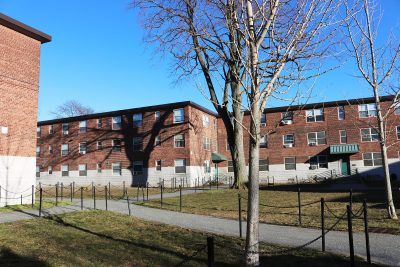The Mayor’s Office announced in a Saturday press release the closing of funds to renovate the Lenox Street Apartments — a historic, federally-funded public housing complex in Boston’s South End neighborhood.

Originally built in 1939, the 285-unit building will be modernized through the infusion of nearly $125 million in financing and a partnership between Beacon Communities and the Boston Housing Authority, according to the press release.
Those renovations are the second phase in the broader redevelopment of the Lenox Street and Camden sister communities announced by Mayor Marty Walsh in January 2019.
Renovations will include improvements to basic building systems, such as heat and hot water, installing solar thermal panels and updated kitchens and bathrooms, said Joseph Bamberg, director of planning and development at BHA.
Construction on the Lenox site began two weeks into February and will take about three years to complete, he said.
Camden Street Apartments — the smaller, state-funded site of the sister communities — was built in 1949 and was the first site to be renovated as part of Phase One of construction, Bamberg said. That construction was completed in September.
Redevelopment of the pair of communities originated in 2014, when BHA reached out to community developers requesting proposals to help preserve its property portfolio, Bamberg said.
He added that the BHA and Beacon Communities secured the funding from the State and were able to qualify for historic tax credits — federal subsidies aimed at financing the renovation of historic buildings such as Lenox Street.
“We perennially work in a landscape of low funding, insufficient funding,” Bamberg said. “BHA is always looking for opportunities to carry out innovative financing mechanisms to carry out renovations.”
BHA was also able to convert the Lenox site from a conventional federal housing development into what is now Section 8 housing –– a program that allows low-income families to rent apartments using vouchers, Bamberg said.
Section 8 housing generates “a more reliable and a more robust subsidy stream than public housing,” compared to a conventional public housing program, Bamberg said — with renters still paying about 30 percent of their income as rent, just like a public housing program.
The New England Public Policy Center projected in a 2019 report that by 2035, about 47,000 extremely low-income occupied units in Massachusetts will be at risk of having at least one subsidy expire, due to subsidy programs’ duration restrictions of 20 and 30 years.
Bamberg said even if Section 8 funds were to disappear, the BHA will work to find another way to maintain the Lenox site’s affordability.
“The affordability is built into the property,” Bamberg said. “This is restricted, deeply affordable housing.”
To prepare for construction and the relocation of current residents, BHA stopped placing new applicants at the Lenox site to allow for natural vacancies to occur and gave households the option to relocate to another BHA property or to use a mobile Section 8 voucher to find another temporary apartment.
Renovations will be done building by building, Bamberg said, so that as construction is completed, residents can move back into the newly renovated apartments.
“Not quite musical chairs, because that implies that someone gets left without something,” Bamberg said, “but there’ll be these shifts around the property, people move into new units.”
He added BHA does not intend to displace residents. Housing Opportunities Unlimited, a relocation and household support specialist organization for residents in low-income housing complexes, is helping facilitate the relocation process.
Residents will not have to pay for moving costs, Bamberg said. Once all of the original households return to their renovated apartments, vacancies will be filled by pulling applicants from the waiting list.
“We want original households to know that they have the priority to stay, or if they need to relocate temporarily, to return to the property,” Bamberg said.




